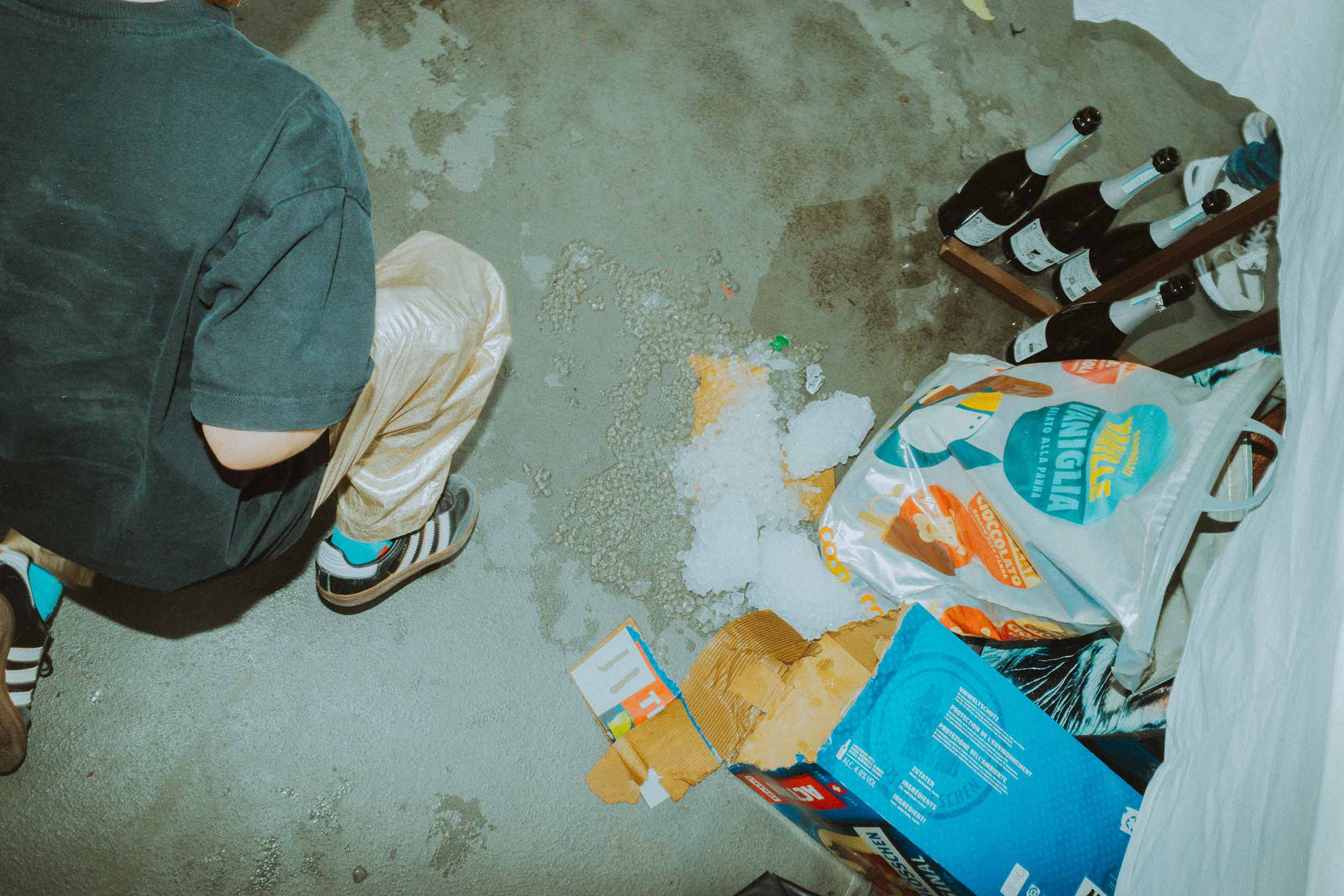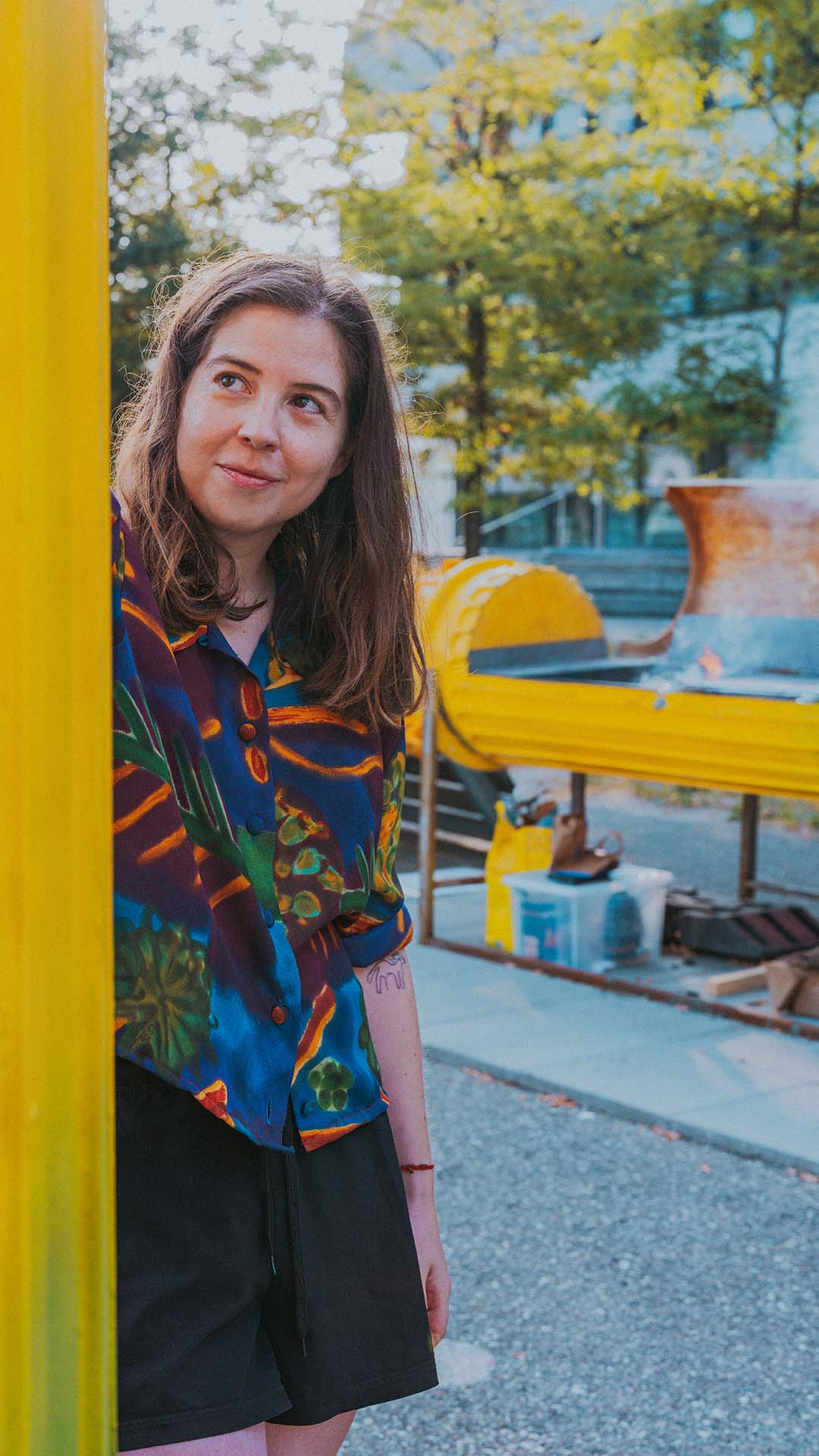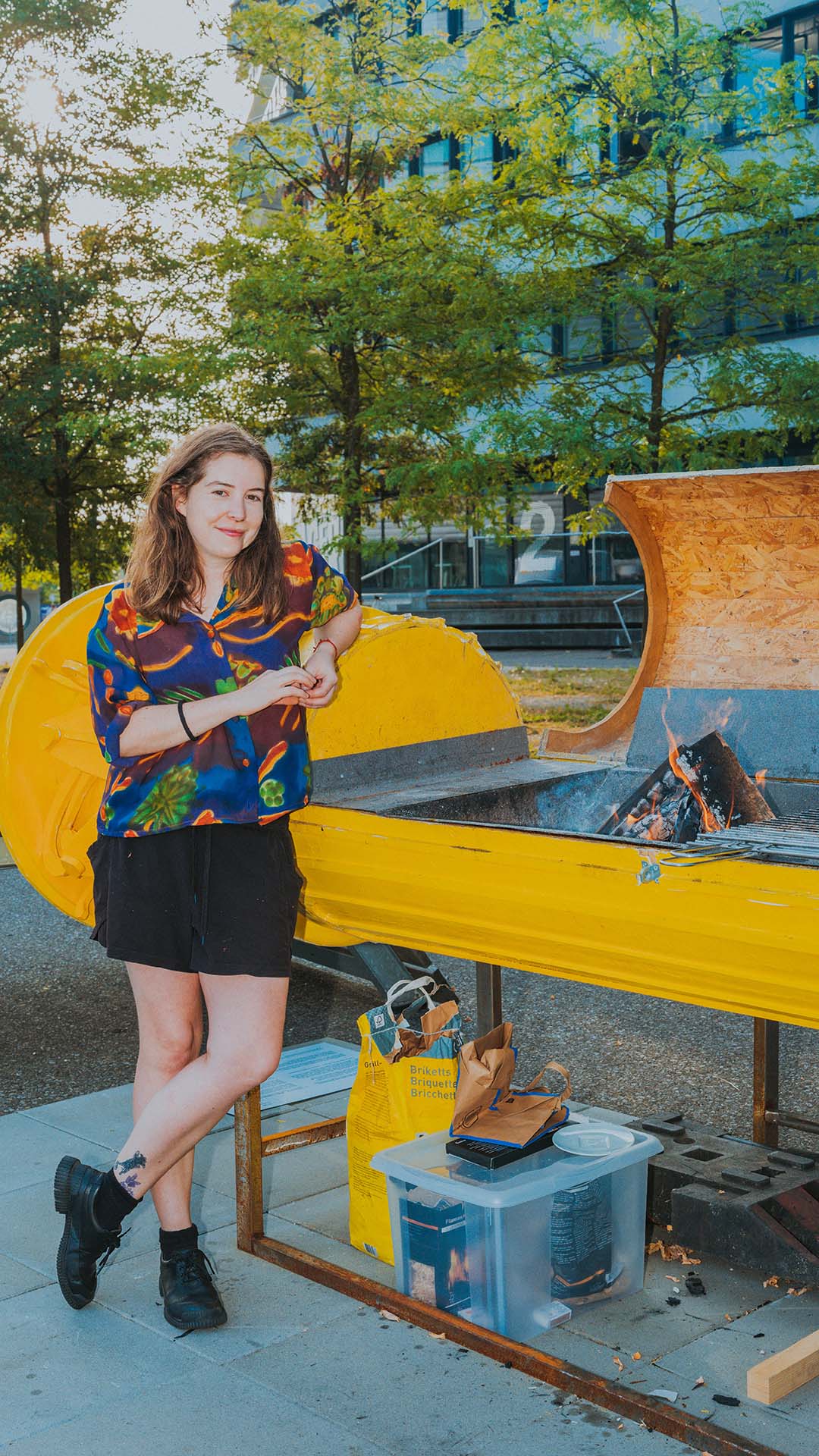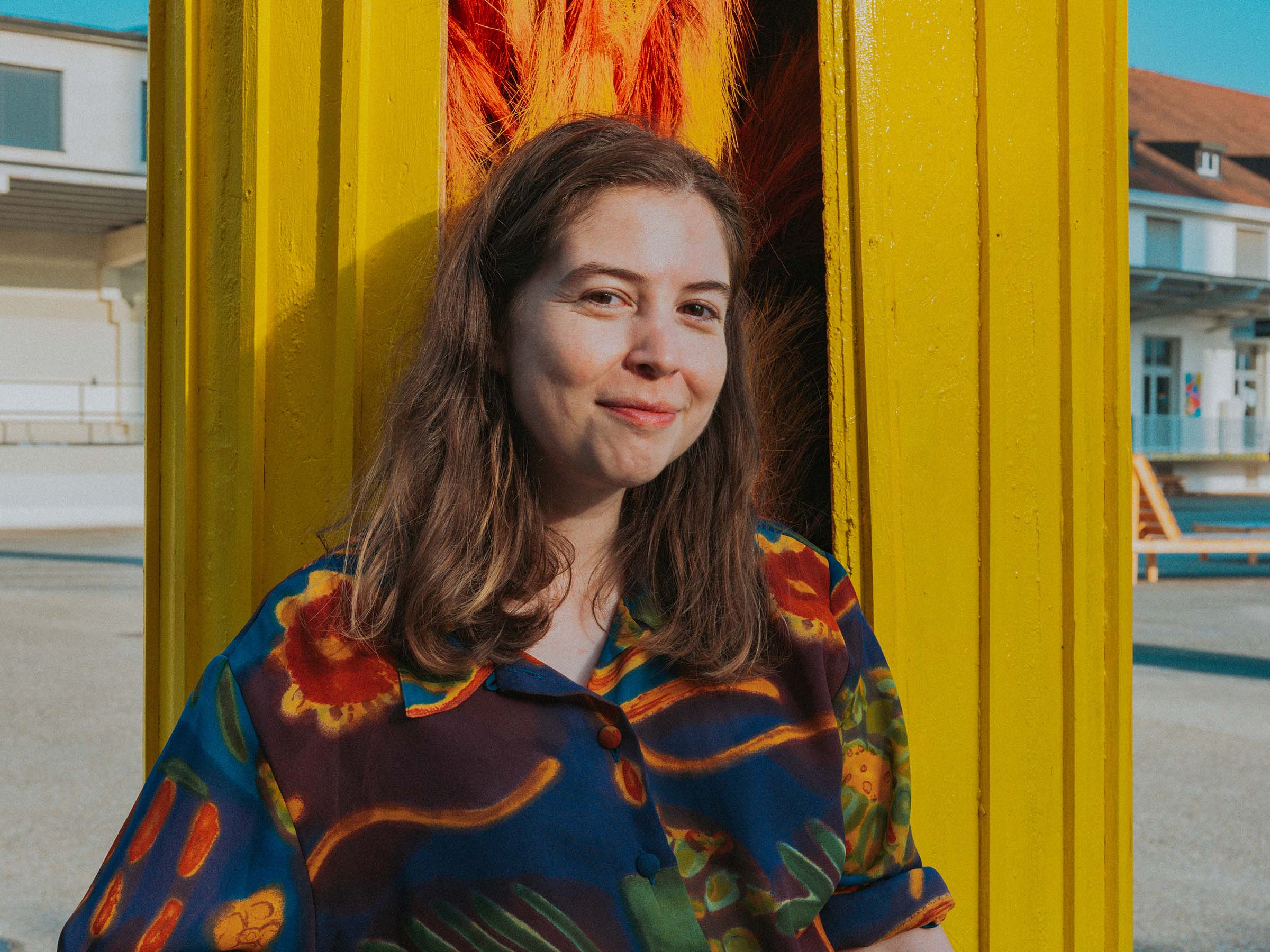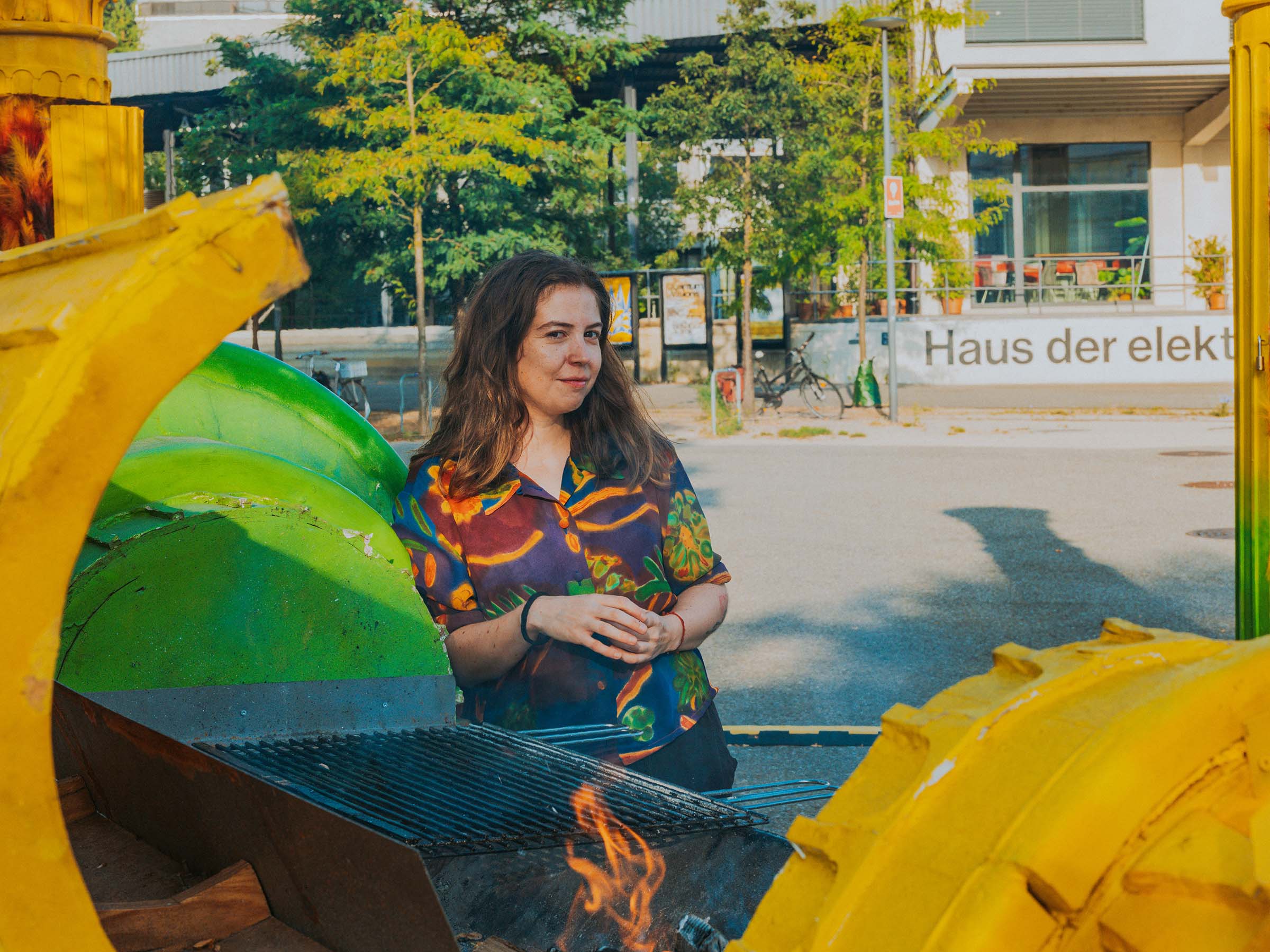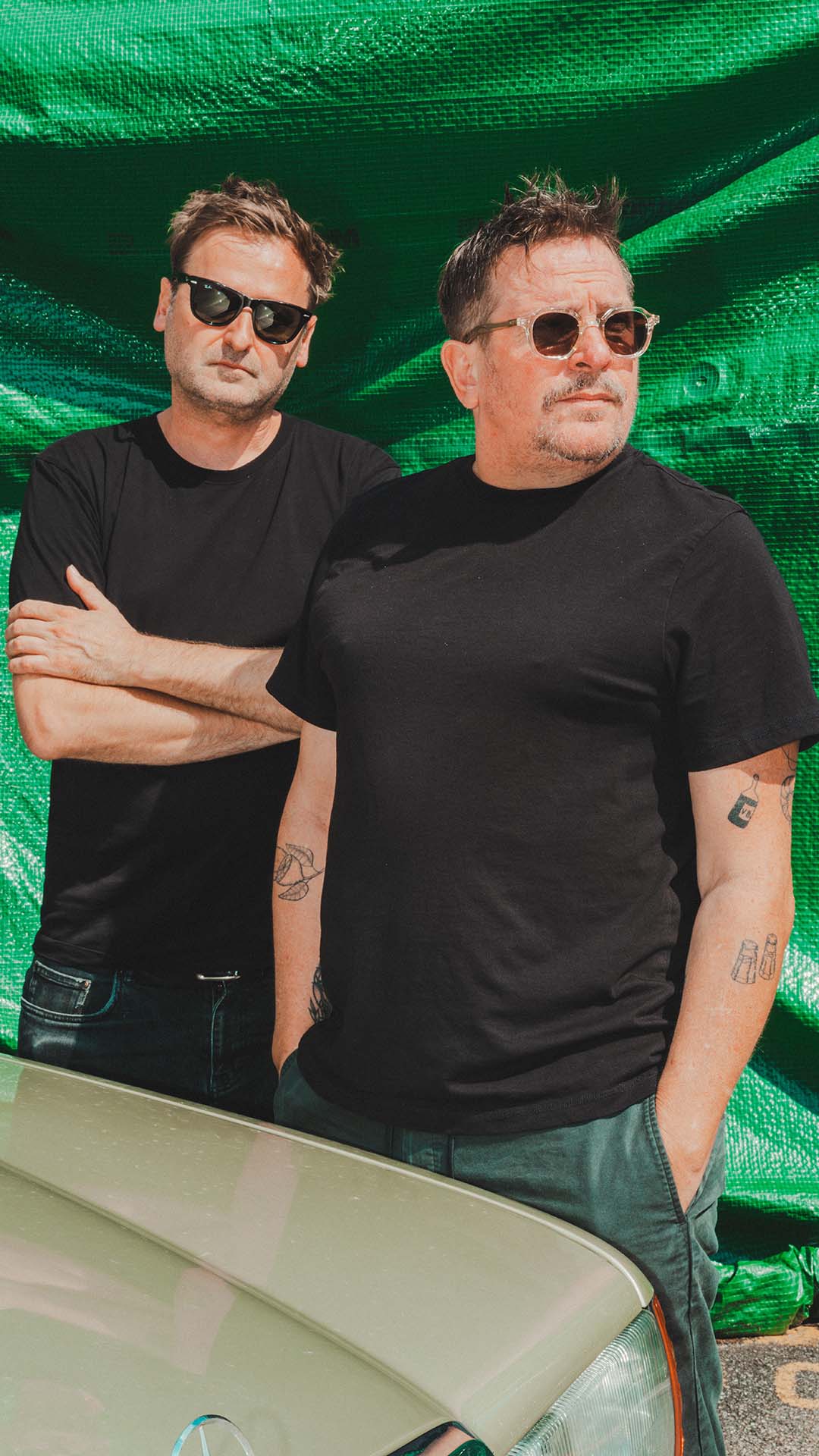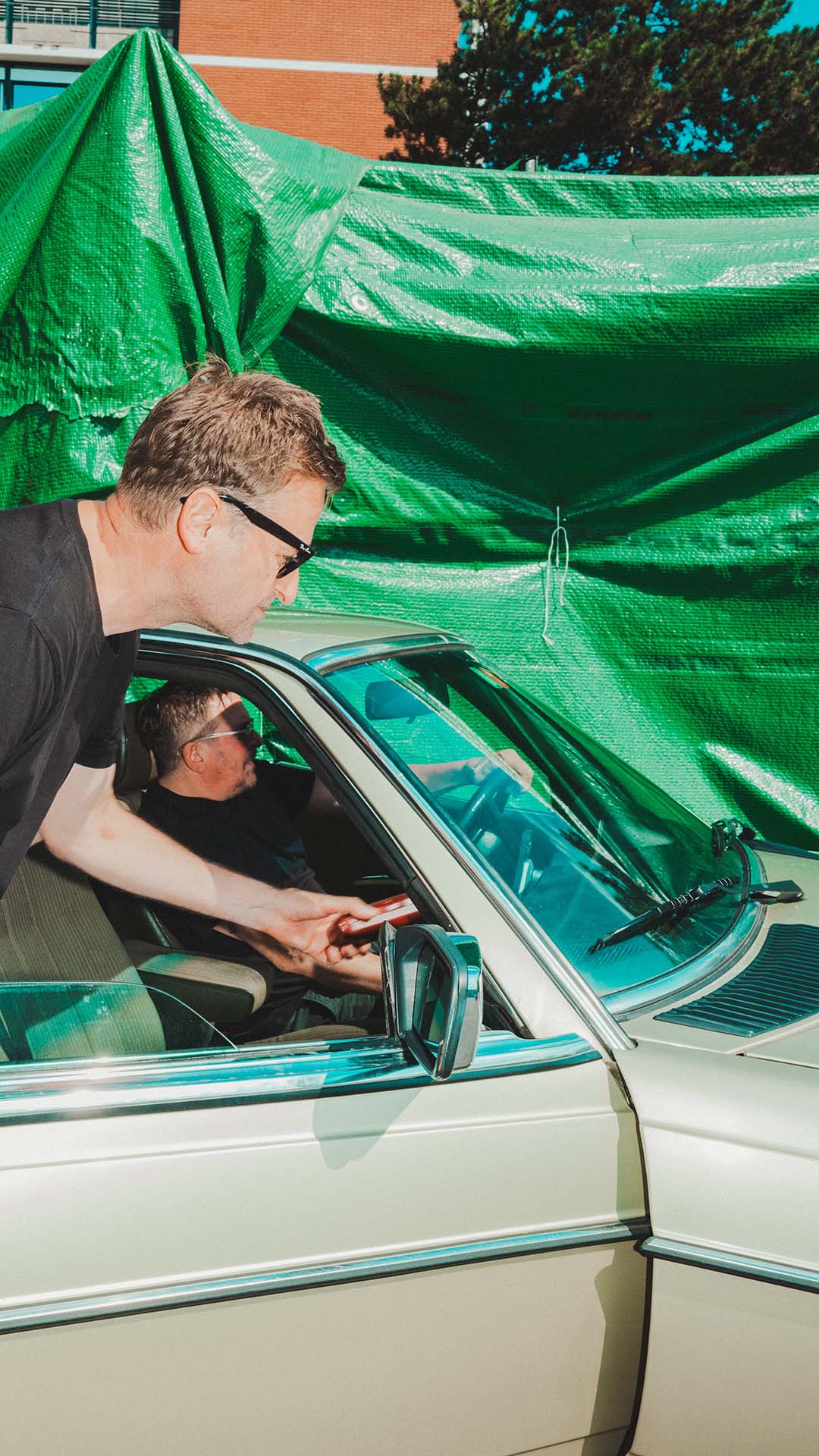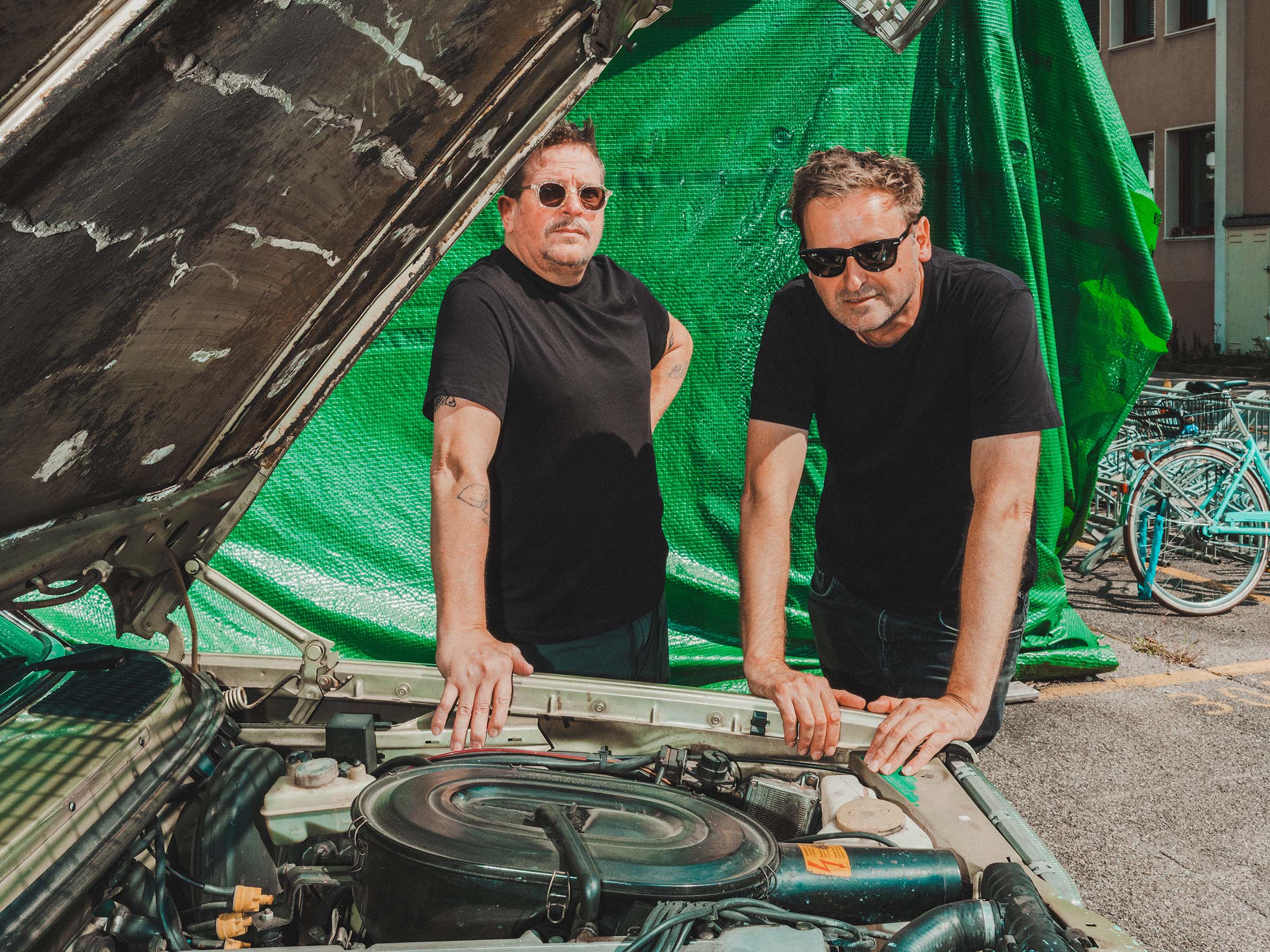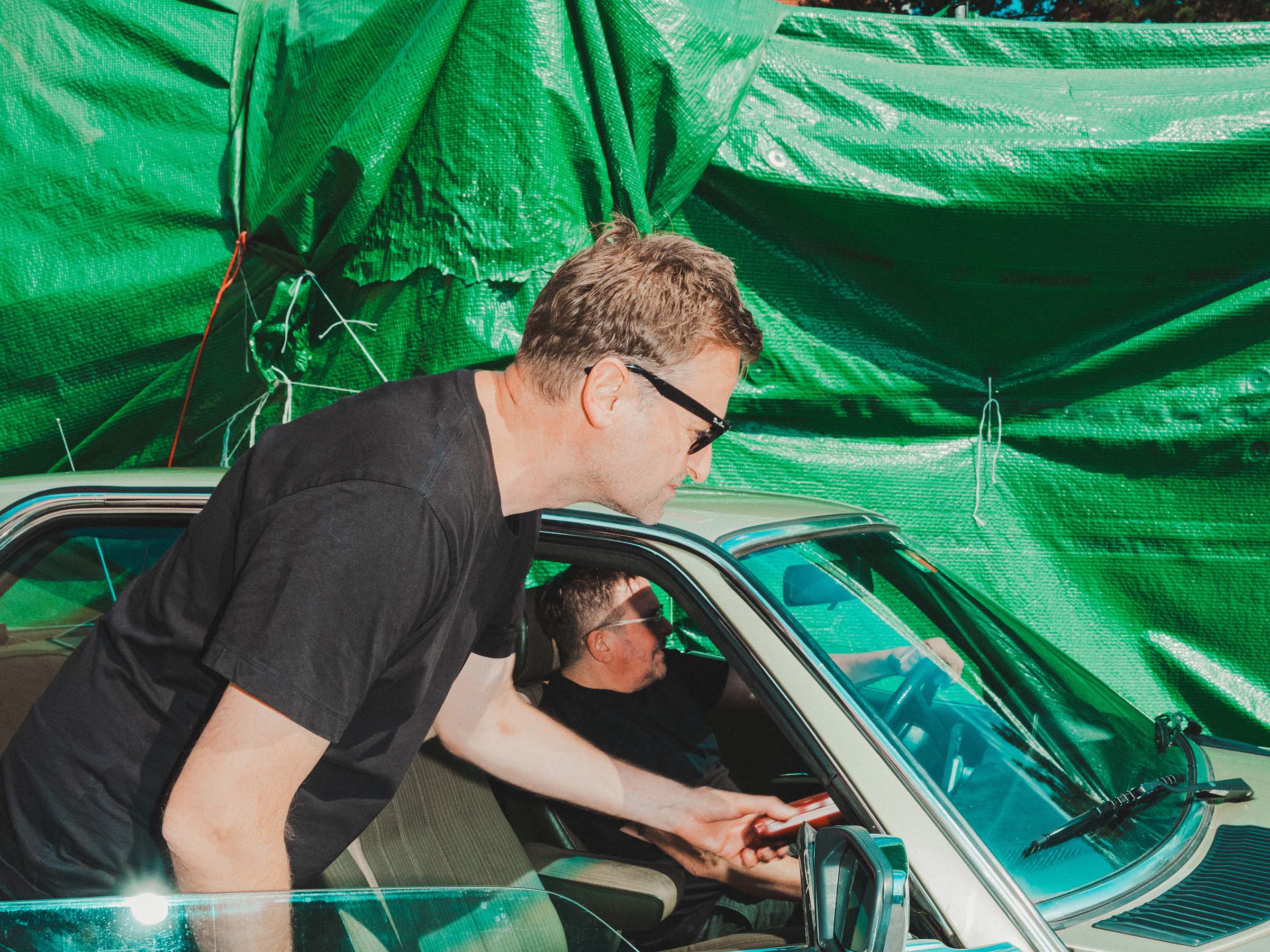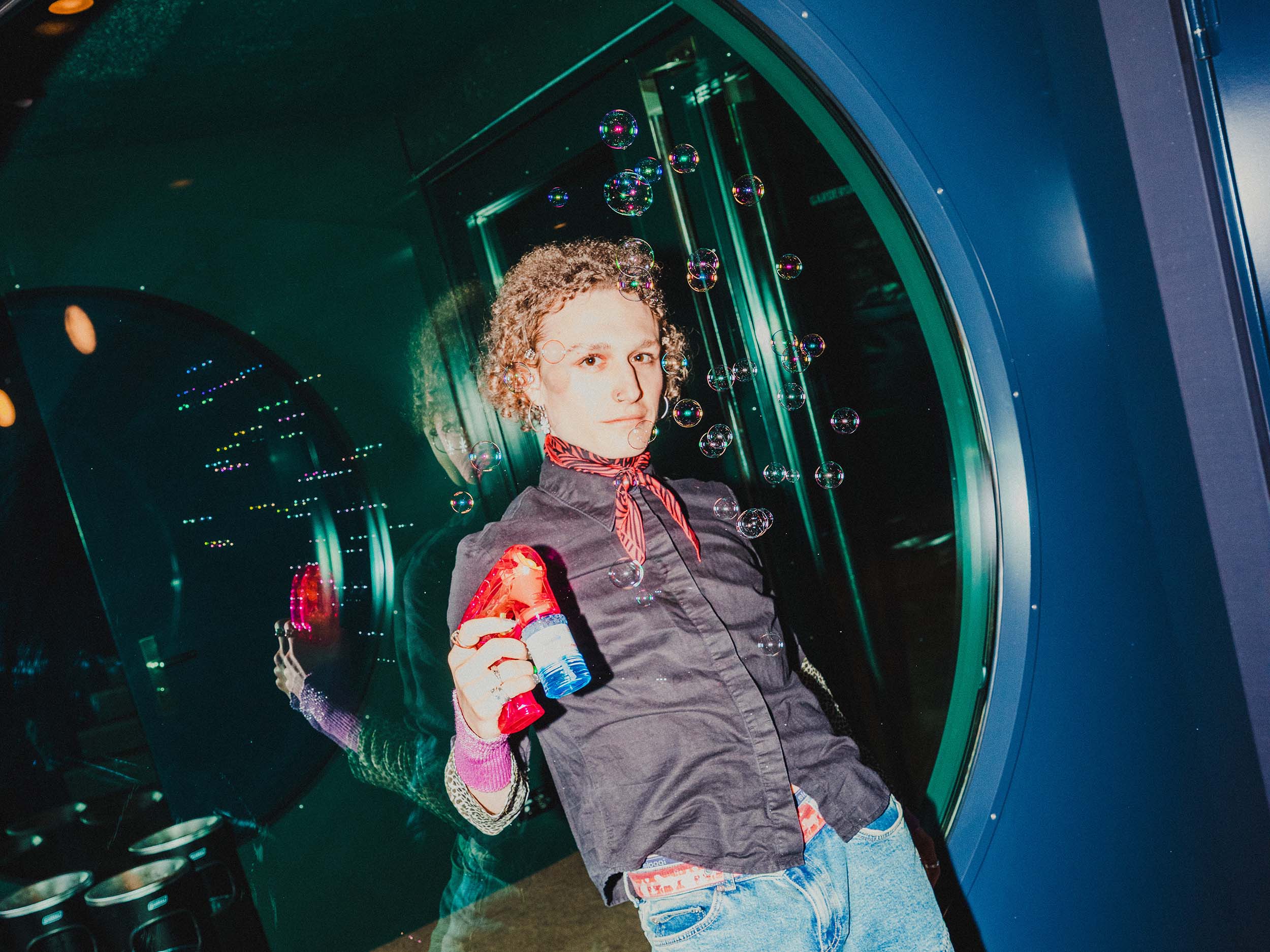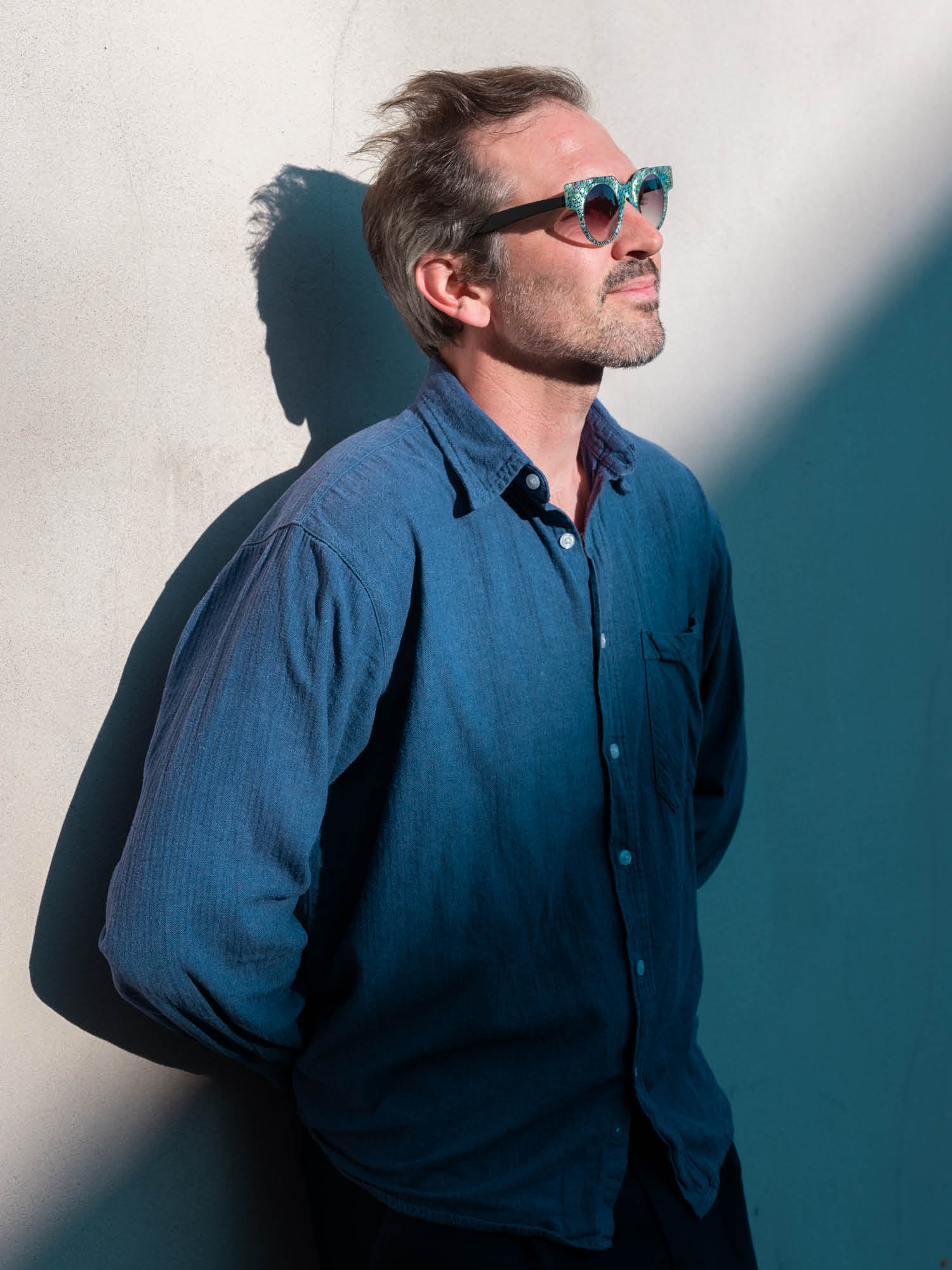Artist
Pilar Quinteros
At a time when we are increasingly turning to artificial intelligence for advice, when we no longer have to look anyone in the eye at the self-checkout counter, and when social media just tends to make us lonelier rather than bringing us together, Pilar Quinteros is out to find places where real closeness is possible. Such spaces of encounter have become rare, so she decided to build them herself. Born in 1988 in Santiago de Chile, the artist creates installations in public places that enable people to congregate and come face to face with art when they aren’t even looking for it.
Quinteros has visited Basel on a regular basis since 2021. She now lives in the city and is completing her master’s degree at the FHNW’s Institute Art Gender Nature.
Even as a child, Quinteros was aware that her creativity could bring people together:
“I was an introverted girl, but when I started drawing in the classroom, the other children would come over to me and I thought: I’ve got something here.”
She wasn’t driven by fame but by social contacts, and the same is true today. Despite the spatial and performative dimensions of her work, she still sees herself, first and foremost, as a drawer. For her, sketching with pencil and paper is a form of listening: “When other people tell me their stories, they become real for me,” she says. Her art often begins with these stories and ends with shared experiences.
For Quinteros, it doesn’t matter if architectural structures last for centuries or just a short while. Ancient temples made of marble have the same artistic value as fleeting temporary installations. “The idea that something lasts forever is anyway just a fiction.” In the past, finitude was something that scared her, but today she sees it as an opportunity to play an active role in designing our world. Appropriately, she turns to materials such as cardboard or wood: intentionally fragile materials that underscore the transience of her works. “What happens when we try something out and we don’t like it? Then we break it apart again and start afresh.”
The fact that she works tirelessly for her art is something Quinteros feels isn’t worth talking about. She often works alone for days, building, hauling, screwing and glueing things together. She’s a bit perplexed by other people worrying she might exhaust herself—the physical experience of her work brings her joy and an intense sense of being present. “Doing is part of thinking,” she says. Use a 3D printer? Totally absurd. For her, strength lies in direct, hands-on work, which she sees as a form of meditation. She compares it to running, a passion she inherited from her father, an avid marathon runner. After all, no one can run a marathon for someone else—and she feels the same way when she thinks about handing over control of the artistic process.
Her current installation Temple of Fire can now be seen in the Dreispitz quarter as part of the series Public Art@Freilager-Platz. It features three seemingly antique yellow-green columns with fires blazing away within. One of the columns is lying on its side and contains a grill, which the public can use over the entire course of the installation. “Someone has to take care of the basics,” says Quinteros. She’s talking not just about the ability to make fire but also the fundamental aspect of being with others: eating together, thinking together, being together.
The grill is very popular: some students pulled up a bench, while other people made a box of materials available. Quinteros’s columns don’t seem like relics of the past but as a place for coming together in the present. Only at second glance do we notice an additional detail: the artist’s first name “Pilar”—are the “pillars” in her work just a coincidence?
Temple of Fire will be on display on Freilager-Platz until the weekend of the Basel Art Days, and the grill can be used by the public. The master’s students from the Basel Academy of Art and Design FHNW are holding their graduation show on Friday, August 29, and visitors are invited to a barbecue. Quinteros will make it quite clear that this temple is not going to be around for centuries—it’s all set to go up in flames on August 30 at 7 p.m. in a performance staged as part of the Art Days.
Text: Philomena Grütter
Photos: Pati Grabowicz
Artists
Ado Jahic & Comenius Roethlisberger
When the Basel artists Ado Jahic and Comenius Roethlisberger get to talking, it’s obvious that the two of them have a close connection. While Jahic easily segues from one anecdote to the next, Roethlisberger adds his own pointed comments to each story. When discussing coincidences and their passion for cooking, music, and art with Bebbi Zine, they both always strike the right note.
“We never planned to team up,” says Jahic, who made the move from graphic design to art. Actually, it was pure chance that brought the two of them together while setting up an exhibition. Since 2006, Jahic and Roethlisberger have been an inseparable pair, at least when it comes to their art, and their numerous exhibitions, publications, and projects have made them a fixture on Basel’s art scene.
“We’ve been riding a great wave for the last four or five years,”
says Roethlisberger, who used to work as a photographer. What’s remarkable about their shared success story is that these two congenial artists generally continue to work on their own and without the support of a gallery. What they do have is their own publishing company. “We wanted an ISBN number for our first publication, so we founded Bolo Publishing,” says Jahic. The driving force behind its founding was his life partner, Julia Lambrecht, which explains why the independent publishing house is named after her favorite dish: spaghetti bolognese. A lot of the creative work they both do is tinged with activism. As Jahic adds, “You have to see the opportunities and then stay on the ball.” Bolo has now put out seven publications, and their “cool and expensive hobby,” as Jahic calls it, has turned into a project that is now paying for itself. Two titles, in particular, have been responsible for this shift: Artist’s Recipes (2015) and MUSIC: A Conversation Through Song Titles (2021). Both of these books bring together contributions from well over a hundred internationally renowned artists with a passion for music or an interest in cooking.
The two of them also do a bit of cooking during Carnival in Basel, when their project space at Spalenberg 64 is transformed into a Stuubete: a place where avid Carnival revelers and art enthusiasts meet over the city’s best meat patties. The venue is renamed Chez les Artistes for three days, and that is what it literally becomes—an artists’ hangout—with the walls covered with artworks from floor to ceiling. Although these pieces are reminiscent of iconic pieces hanging in major museums, they are actually made by Jahic and Roethlisberger themselves. “We’re big fans of other artists,” Jahic says. But the works hanging on the walls, which look like they’re by Warhol, Bourgeois, Tillmans, or Hirst, aren’t copies but appreciative homages. It’s a bit like when musicians cover the songs of other bands. One artist whom Jahic and Roethlisberger especially rate for her intuition and spontaneity is the Basel-based Renée Levi, and the pair also dedicated a work to her—a declaration of love that did not go unnoticed and eventually got them talking. Levi’s works will be shown in the Spalenberg venue—she’s been given carte blanche, and it’s even rumored that the artist duo’s homage will be shown there as well.
Meanwhile, the pair have been working on their next projects, which they are developing in their studio on Basel’s Franck Areal. And the two of them are quite ambitious: “Foreign and institutional shows are the goal,” says Jahic. Roethlisberger adds with a wink: “Züri West is a fantastic band, but we want to go further—we want to really push the envelope.”
Text: Claudio Vogt
Photos: Pati Grabowicz
Artist
Rondi Park
Sometimes Switzerland feels like it’s in the eye of the capitalist storm, says Korean artist Rondi Park. “People seem more relaxed here, and they work less than they do in Korea, where everyone’s always thinking about money.” Born in Seoul in 1993, Park came to Basel in September 2023, and has been studying for a master’s degree in art at the Academy of Art and Design. Right from the start, she has devoted her art to exploring how capitalism shapes our desires.
The artist generally uses bright colors and a variety of materials and techniques. Whether she’s drawing on paper with colored pencils, painting larch wood with gouache, making glazed ceramic sculptures, or sewing pastel-colored fabric together to create large satin works, her work always seems to convey the appeal of consumer culture while at the same time criticizing it. “It’s always been important to me to make art that is visually satisfying,” says Park, referring to a quintessentially Korean “aesthetic of cuteness” that she draws on in her own work. “In Korea, if something is cute, then it’s harmless; it makes you want to protect it and own it.” It is precisely the perceived frailty of this cute consumer culture that the artist uses to illustrate the manipulative nature of capitalism.
“After all, we’re now living in a state where we no longer know whether our desire for something is really ours or has simply been whispered in our ear.”
Park’s works often have long titles like Opposite of Elephant Market, B1, Shelf of imported goods. among toys; “Mom, can you please look at this please? You don’t have to buy me” (2021)—a light-purple banner made of satin that incorporates a multitude of crystal chains from a chandelier and colorful fabric figures. The child’s desire for a product on the shelf mentioned in the title is reflected here in the soft pastel tones, the gentle materiality of the satin, and the sparkle of the chandelier stones.
What for children may be a coy desire for consumer products is mirrored in the romantic relationships of adults. For a work whose long title she abbreviated to Mirror of Desire (2021), she followed the love life of two female friends for several months. “We spoke every day, and I almost became a kind of therapist for them,” recalls Park. One of them was considering moving in with her Tinder match after their second date. The act of rushing into a love affair is expressed in a large painting of two horses. Depicted in light strokes of gouache and colored pencil, they appear to be galloping out of the picture. This is an example of the simultaneity of wit and emotion that a New York Times critic recently attributed to the artist.
She wants to create art in which her viewers recognize themselves; Park reflects, “That way they become protagonists in my art in the act of viewing it.” And art, in turn, becomes a mirror in which we can recognize our own desires.
Text: Timo Posselt
Photos: Jana Jenarin Beyerlein
Curator
Philipp Messner
The graphics of the large-format posters that once adorned the urban landscape touting historical products like Meta lighters or Binaca toothpaste have an understated, no-frills feel to them. The color lithographs were designed in the early 1940s by Basel-born painter and graphic designer Niklaus Stoecklin. The matter-of-fact aesthetics of the advertisements commissioned by Ciba AG and Meta AG have lost none of their allure over time. Philipp Messner, head of the public poster collection at the Basel School of Design (SfG) since 2020, stands between large, specially designed cabinets pointing to these showpieces, as he explains the meaning of the lovely word Weltformat (world format).
The standard size for advertising posters (90.5 cm × 128 cm) is a specifically Swiss format that dates back to 1910, and a proposal by the German chemist and Nobel laureate Wilhelm Ostwald. In 1912, the advertising committee of the 1914 Swiss National Exhibition decided to produce all official printed matter using the Ostwald system. From then on, the Weltformat became the de facto Swiss standard, while the rest of the world was adopting the paper formats launched by the German Institute for Standardization (DIN) in 1922.
The Basel Poster Collection, located on the art campus at Freilager Platz, holds some 100,000 posters. Between 800 and 1,200 new posters are added each year, making it one of Switzerland’s largest collections. Social and economic history become tangible through the medium of the poster, as does the development of a visual public sphere—i.e., advertising—and of applied graphics. Which is why the institution rightly describes itself as “a key part of Switzerland’s visual memory.” The online database holds around 40,000 digitized posters, an index of the vast visual treasure that is housed and continuously expanded at the Freilager Platz site. “Every dataset crosses my desk,” says Messner. Over the years he has acquired a profound knowledge of the collection’s holdings, which include posters by Emil Ruder, the iconic pioneer of Swiss Style in the 1960s; Wolfgang Weingart, who revolutionized the profession in the 1970s; and the Zurich graphic designer Rosmarie Tissi, who was awarded the 2018 Grand Prix Design for her life’s work. You can also just type in search terms like “Bally,” “theater,” “election,” “SBB” (Swiss Federal Railways), or “opticians” and see what turns up. Incidentally, the search engine also functions with truncations.
“When I make decisions, I try to think for the future,”
explains Messner, who, as an archivist with a background in cultural studies, is also an expert in history and its forms of transmission. He is aware that, like his predecessors, he is building on decisions made before his time, in a collection that dates back to 1896. Messner, who was born in Bern in 1975, prefers the somewhat dry description of “custodian” over the very overused “curator” to describe the scholarly work in museums or libraries. “I work in service to this collection,” he explains. This work combines knowledge of media theory—he once studied with the renowned media and cultural studies professor Friedrich Kittler in Berlin—with a pragmatic attitude rooted in archival practice. Before Messner moved to Basel, he worked for several years at the UZH archive, the central archive at the University of Zurich. His essays and articles, which have been published in various places, can be found on his private website isotype.ch. Together with the critic and author Lucie Kolb, Messner is also part of distro, the informal project nexus, which is itself a part of the collectively coordinated InfoSpace initiative, based in the self-organized cultural and studio house Auf dem Wolf 11 (ADW11).
“I view archives as democratic institutions,” Messner reflects at the end of our conversation. For the poster collection, this means foregrounding the plurality of possible alternative narratives alongside the canon of graphic design history—for example, hitherto little-explored technical aspects of printing in poster history or the mindset underpinning colonial images, which naturally found expression in poster advertising. Seen in this light, the collection’s holdings have just as much to say about the world we live in today as they do about the past.
Text: Kito Nedo
Photos: Pati Grabowicz
Artist and Theater Educator
Kapi Kapinga Grab
The biennial wildwuchs festival has been a permanent fixture on the local performing arts calendar for more than twenty years. Beyond the actual festival itself there is the traveling format wildwuchs Unterwegs, which enters into artistic dialog with cultural and educational institutions, helping them to initiate sustainable practices.
The performance artist, theater educator, and Zurich University of the Arts (ZHdK) lecturer Kapi Kapinga Grab has been a member of the association behind the festival since 2022. Born in the Congolese capital of Kinshasa, she came to Switzerland twenty-five years ago, after numerous engagements abroad (including at Théâtre le Manège in Mons, Belgium). Today, she is responsible for the festival program in Basel, working closely with a team from a variety of artistic backgrounds, who bring multiple perspectives to bear. For Kapinga Grab, such an approach is a necessity:
“wildwuchs is like sourdough, it’s alive and constantly changing. And, as in every good dish, the work that goes into it and the people behind it are at least as important as the ingredients that you are working with.”
Joint decision-making is a characteristic feature of the transformation process that wildwuchs is going through under her artistic direction. “Before curating the program and getting stuck into the creative work, we first have to ask ourselves who we want to collaborate with and what expertise we’re looking for.” As in other leadership roles she has held, for Kapinga Grab the new position—and the power that comes with it—raises the question of how this power should be handled. In practice, this means being able to surrender it, recognizing expertise in others and getting behind a consensus when opinions diverge. “This is no place for lone warriors. We have each other’s backs, and collaborating on the program as a group benefits the festival no end,” she explains.
The next step was to set up an inclusive space that allows people to enjoy working together. As Kapinga Grab puts it, “If you and I are both in a good place, we can work together in a better way.” Her own art practice, as well as her experience as a lecturer for the Critical Social Practice in Art Education program at the ZHdK, has sharpened her awareness of the underlying mechanisms of exclusion at work within performing arts organizations. So she makes a point of scrutinizing and laying bare these structural relationships, finding ways to address them artistically in the festival programming. In the context of wildwuchs, this is a radical process—one that starts at the roots: “If we want to increase access internally and allow the festival as a whole to ‘run wild,’ we need the proper soil.”
But for the cultural association—which explicitly affirms diversity, inclusion, and accessibility—turning this into a reality was not helped by the logistics of the festival format: a limited budget, few full-time staff, temporary employment contracts, and a certain lack of flexibility when it comes to accommodating the participants’ needs. “Once we got to work, it became clear to us even at the conception phase that we had received little consideration, and that both internal and external access to the ‘festival’ format per se was pretty limited.”
For Kapinga Grab, festivals need rethinking, in order for the people who you want to include more can be involved right from the planning stage. This not only applies to audiences and the choice of artists, who otherwise receive little visibility, but also decision making. Together with her team, she is attempting to translate insights into actionable steps and adapt processes as they go along. They are happy to accept that it might not work: “As with any venture, there is no guarantee that what we are trying here will succeed. But we are building trust with our approach. We have to experiment if we want to break out of established practices and deconstruct and decolonize existing structures.”
The transformation is not limited to internal structures. The external face of the festival is also changing, and this year’s edition, titled m_other tongues, represents another break with the past, with wildwuchs happening on three consecutive weekends, each with a different thematic focus. The idea is to tailor the format to the habits of different audience groups. An eleven-day program with events taking place simultaneously in various locations with different access options—as has been the norm until now—is anything but inclusive; for example, in terms of accessibility for people in wheelchairs. Change is also needed if the festival wants to continue into the future: “We enjoy challenging habits in a playful way and are keen to pick apart the festival concept. Instead of trying to find out why we are not attracting certain demographics, we need to turn the question around and ask: ‘How can we keep removing hurdles to create better access?’”
Text: Samara Leite Walt
Photos: Pati Grabowicz
Musician
Luci Bling
It’s not always easy overcoming your inner badass—especially in the world of hip-hop and rap. But it’s worth doing: as one of the seven members of rap crew WAS DAS?, Smeshi has already showered thousands of fans with content that tells the genre’s clichés to take a hike. Whether it’s reworking the national anthem or penning an ode to uptight small-town life, it’s all about self-reflection. The next step is a new solo project under a new moniker, and Luci Bling (they/them) is getting listeners to be part of the process. Bling’s highly personal songs about worries, weaknesses, and misgendering show that it’s perfectly possible to dream and stay true to yourself.
This kind of “bling” is all about being glitzy, cute, and kitsch. And the title of their debut EP, Gloss und Hype, really nails the project: Bling has created an outlet for moods that range from pop to hyperpop without laying claim to any specific genre. According to Bling, their musical interests are much too fluid for that. But then they also say: “If I imagine going to a rap concert, it sounds way less cute than going to a pop concert.”
“Ich wird widr mol misgendered / ineme Backstage voller Rapper / setze uf die altebewährti Technik / wär isch krass, wär krässr”
(“I get misgendered again / backstage full of rappers / rely on the good old tricks / who’s sick, who’s sicker”)
—from the song “Nice Try”
Once Bling gets onstage and performs, you can’t tear yourself away: they look relaxed, their gestures are charismatic, the lyrics are revealingly honest. “I always found performing easy,” admits Bling with a grin, “but it wasn’t planned, it just happened.” This nonchalance seems to be the vibe: during Eurovision, Bling (as Smeshi) will be back performing with WAS DAS? on the large stage at downtown Basel’s Barfüsserplatz. But, appearing solo as Luci Bling, they’ve also grabbed the attention of the indie music scene: as the opening act of this year’s Kick Ass Awards organized by Radio 3FACH in Lucerne, and performing, just two days later, at the brand-new Kuppel venue here in Basel. These were not only the first two concerts in the new solo project, but also the first time that Bling had ever stood onstage alone without the crew.
“so viel am verlerne, doch no immr lerne / wie mi sälbr liebe, ohni inneri Härti / ohni immr zerscht mir sälbr pressure mache / es isch endless so tief und fescht verankert”
(“So much to unlearn, but still learning / to love myself without my inner badass / not always stressing myself first, it’s endless, so deeply fixed in me”)
—from the song “Nacht” (Night)
Toxic gender clichés are still a big part of the rap scene, and unthinking artists spread these ideas to hordes of younger fans. Even Bling, at the start of their creative journey a decade ago, was socialized by this culture of being better, phatter, sicker. “There just weren’t any role models,” they reflect, and stress that “listening to and trusting my inner voice was a long process, and it still is.” It hasn’t gone down well with everyone, and the virulently transphobic comments that regularly land in Bling’s inbox are hurtful, but also make them feel a touch of pride. As a musician who is trying to be as authentic as possible, Luci Bling is suddenly becoming something of a role model for genderqueer rappers, confronting patriarchal power structures with self-love and cuteness. And so the journey through the pop galaxy proceeds with new songs, a new EP, and a whole lotta bling—this fall at the very latest.
Text: Mirco Kaempf
Photos: Pati Grabowcz
Drag Queen
Odette Hella’Grand
Odette Hella’Grand is an artistic figure. An elegant, classy drag queen who exudes the glamour of old Hollywood. She is the creation of a very large and muscular man who dominates the stage as a woman. And it is precisely this contradiction that has become an intense form of symbiosis for her. “Odette allows me to be more direct and more honest, to be nastier, without having to excuse myself,” she says. But for all that she inhabits the role, there is still a clear separation between her private life and being onstage: “At 10:30 p.m. I take off my makeup and am myself again.” Odette prefers to describe her work as “travesty.” “I distance myself from American drag culture à la RuPaul’s Drag Race, where it’s all about drama and money. The craft is what’s important to me: homemade costumes, my own wigs, putting together a show.” As a host, she prefers collaboration and talent promotion over self-projection.
“Egotism doesn’t do anything to help the drag scene. I want to get other people up onstage.”
Basel may not by a major drag center, but Odette has played a key role in building a scene in the city. “Ten years ago, there were no evening-long drag shows here,” she remembers. “For me, it was important to bring drag out of the club scene and cherish it as a form of art. Not performing at half past one in the morning between DJ sets when everyone just wants to dance. I want audiences that come especially to see us.” And in the meantime, a lot of people are coming: “From the twelve-year-old kid who wanted to come to my show with his family to the ninety-five-year-old grandpa who was just curious. I always ask who in the audience is attending their first drag show, and it’s always around fifty percent.”
She doesn’t see herself as a flag-waving political activist, though. “Of course, my performance is a statement. I’m a man appearing onstage as a woman, which means I’m questioning social norms. I want my audience to laugh and be entertained—but they should also start thinking while they’re laughing.” One of her most emotional memories is her performance at a funeral. “After the show, the widower pressed flowers from his husband’s grave into my hand and said: ‘This is my husband’s last bouquet for your art.’ I walked home with two hundred roses and knew that what I do is really important to people.”
During the Eurovision Song Contest, she’s moderating the Eurovision Village in the Basel Congress Center, together with Tanja Dankner and Joël von Mutzenbecher, and she shares the stage with Conchita Wurst, Anna Rossinelli, Rednex, and SNAP! “I remember seeing the Danish artist DQ perform at Eurovision in 2007 and thinking, ‘What the fuck, is that a man?’ In ‘Drama Queen,’ she sings about how she brings color to the grayness of everyday life. I mean, hell yes, nothing better than that. For me, the Eurovision will be the glittering queer party of the century.” If you’d like to see more of Odette live, she’ll be performing on May 16 from 7 to 11 p.m. at Sudhaus.
Text: Anja Adam
Photos: Pati Grabowicz
Musician
Denis Wagner
Denis Wagner (they/them) writes poetry, creates theatrical projects, and sings at major festivals around the world. Right now, Wagner is on tour with the metal band Zeal & Ardor, and in May they’ll be appearing on the Barfüsser stage with their own band, Hæsin, as part of the supporting program for the Eurovision Song Contest. We got together with the artist to talk about being famous, the drive to entertain people on stage, and deeply held beliefs.
As far as Wagner is concerned, it has always been about just getting out there and performing. Childhood photos show them singing with a candle as a makeshift microphone. Despite being able to read entire books by the age of six, they point out, “It wasn’t that I was any brighter than the others. I just always found stories massively cool.” The same was true for music and acting. Wagner, who had been involved in setting up two bands by the time they were fifteen and was already an experienced performer, comments:
“I always wanted to be famous.”
But they see things differently these days: “I find it more important to be able to choose whatever I want to do.”
They like things that others find weird, like leeches and silverfish. The latter appear in a children’s book that they wrote and is currently waiting to be completed. Leeches play the leading role in one of the artist’s plays, Horror and the Healer, cowritten with Luzius Bauer and Leonie Merlin Young; it was produced for the 2021 Treibstoff theater festival. “I’m interested in things that are ambiguous, that you can discover from a new point of view. I like turning deeply held beliefs upside down.” The fact that Wagner sings with a metal band fits in well with this ambiguity. They don’t view themselves as a metal singer—Hæsin is closer to indie pop or rock, and the artist writes the lyrics for their songs in standard German rather than Swiss. Wagner’s voice can sound velvety soft, “but I like yelling on stage too,” they admit, referring to joining Zeal & Ardor in 2016. They were already singing and shouting onstage at Junges Theater Basel back in 2010, in a mash-up of music and theater called Punk Rock (“I like it when people see me as an entertainer”). Anyone who’s ever been to a Zeal & Ardor or Hæsin gig knows that Wagner doesn’t just sing but rather embraces a very specific role. They like dancing and moving around while performing—“I think it’s great that everything is allowed onstage”—and that’s where their acting experience shines through. They wouldn’t necessarily wear a skirt IRL, but onstage it makes them feel secure and carefree. When asked if Nemo’s victory was justified, Denis answers, “Anyone who says it’s a political decision should try sticking themselves on a rotating disc and singing opera.” But it was a crucial decision for society nonetheless: “Right after winning, Nemo started campaigning for nonbinary people to be officially recognized in Switzerland. It’s a really appealing idea to just not have a sex listed at all on your passport rather than lots of identities being lumped together under a ‘third’ option labeled ‘diverse.’”
Wagner is looking forward to performing with Hæsin on the Barfüsserplatz stage, “I think it’s important that we put on a good lineup as the Eurovision host. And Barfi—as the venue is affectionately known—is always bursting with positive energy.” Who knows? Maybe Hæsin will premiere a few fresh songs. Four new tracks have already been recorded, and the album is scheduled to drop later this year.
Text: Danielle Bürgin
Photos: Jana Jenarin Beyerlein
Curator
Benedikt Wyss
At a time when violence is steadily becoming a global political leitmotif, implanting a violence-themed festival into the heart of a city is definitely a bold undertaking—or even an outright adventurous one. Either way, Benedikt Wyss, curator and joint manager at Kunstverein SALTS, fits the bill, and with Theater Basel needing someone with a good feel for complex themes and the right timing to cause some upheaval, they approached Wyss to organize a happening on the theme of violence.
“Violence is so ubiquitous,”
says Wyss. “But we don’t talk about it enough. That intrigues me.” Which is why, while the event that’s set to go down in Basel does recall the happenings of the past, it also opens up a new chapter in his professional biography.
Wyss studied history and sports and qualified as a high school teacher before gravitating toward the art world. “I’m interested in mediating. In the question of how we communicate.” While training as a curator at the Berlin University of the Arts, he chanced upon the Social Muscle Club in 2013 and imported it to Basel.
The first thing he needed there was a venue—the ballroom of the five-star hotel Les Trois Rois, for example. Regular people, uncertain what to expect but all spiffed up nonetheless, would meet here in a spirit of curiosity and get to know one another in small groups under the guidance of hosts. The idea was for them to treat each other to something. The sharing was interspersed with brilliant show elements and beguiling surprises that turned the Social Muscle Club into a full-on experience—a heady mix of self-help group and collective rapture. Anyone who’d experienced it wanted to go back again. The good news is that a relaunch is scheduled for 2026—an Ultra Social Club.
Wyss’s event philosophy is also reflected in his invention of the Draisine Derby. Held once a year on some defunct freight tracks, this is a race for teams in self-built vehicles, and there’s even a prize for the team that fails most spectacularly. “That’s probably the most important cup,” he admits.
But his latest offering goes by the name of Social Fight Club: Sampling Violence at Theater Basel. What’s this all about?
The context is a production with the brash title of Ode to Europe’s Violent Youth. Together with Inga Schonlau, Wyss is in charge of curating a three-week happening around this production to explore the multiple facets of violence. There will be workshops, debates, self-defense classes, and a games night.
“We want to provide a space for physical experiences and collective reflection,”
he says.
As so often in Wyss’s work, the goal is not just to connect place, theme, and audience, but to set something in motion between them—to generate shared momentum. And of course this coming together and search for a common language is the only appropriate answer to the political theme of our time: violence.
Yes, there will be house rules. But neither money nor status will be prerequisites for entry to the first Social Fight Club in Basel. Wyss hopes that as many people as possible will drop in.
Text: Daniel Faulhaber
Photos: Jana Jenarin Beyerlein
Contributors and authors
ABOUT
Bebbi Zine is published for the third time in May/June 2025 to celebrate, promote, and connect the cultural scene of Basel – initiated and published by the Verein Bebbi Zine.
Authors
Anja Adam, Danielle Bürgin, Daniel Faulhaber, Mirco Kämpf, Samara Leite Walt, Kito Nedo, Timo Posselt
Photographers
Pati Grabowicz, Jana Jenarin Beyerlein
Editorial Board
Sina Gerschwiler, Philomena Grütter, Samara Leite Walt, Claudio Vogt
Proof-Reading
Rosmarie Anzenberger (German), Rachel Walther (English)
Special Thanks
Elena D’Orta, Maurice Haug, Chrissie Muhr, Kito Nedo, Nicolas Schmutz



